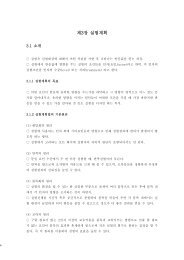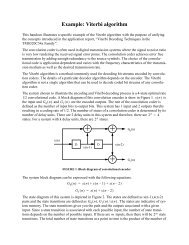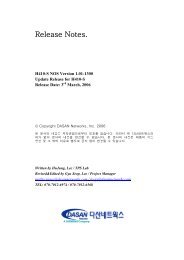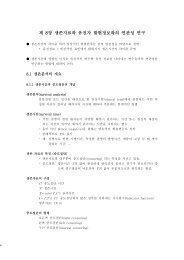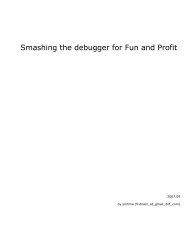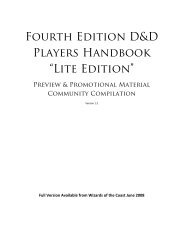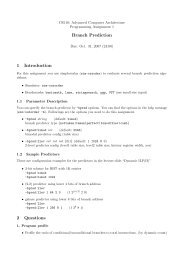<strong>to</strong> confront some of the most difcult issues of the consultant-client relationship. To geta sense of the difference productive reasoning can make, imagine how the original conversationbetween the manager and case team might have gone had everyone engaged ineffective reasoning. (The following dialogue is based on actual sessions I have attendedwith other case teams at the same company since the training has been completed.)First, the consultants would have demonstrated their commitment <strong>to</strong> continuous improvement<strong>by</strong> being willing <strong>to</strong> examine their own role in the difculties that arose duringthe consulting project. No doubt they would have identied their managers and the clientsas part of the problem, but they would have gone on <strong>to</strong> admit that they had contributed<strong>to</strong> it as well. More important, they would have agreed with the manager that as theyexplored the various roles of clients, managers, and professionals, they would make sure<strong>to</strong> test any evaluations or attributions they might make against the data. Each individualwould have encouraged the others <strong>to</strong> question his or her reasoning. Indeed, they wouldhave insisted on it. And in turn, everyone would have unders<strong>to</strong>od that act of questioningnot as a sign of mistrust or an invasion of privacy but as a valuable opportunity forlearning.The conversation about the manager’s unwillingness <strong>to</strong> say no might look somethinglike this:Professional #1: ‘‘One of the biggest problems I had with the way you managed thiscase was that you seemed <strong>to</strong> be unable <strong>to</strong> say no when either the client or your superiormade unfair demands.’’ [Gives an example.]Professional #2: ‘‘I have another example <strong>to</strong> add. [Describes a second example.] ButI’d also like <strong>to</strong> say that we never really <strong>to</strong>ld you how we felt about this. Behind your backwe were bad-mouthing you—you know, ‘he’s being such a wimp’—but we never cameright out and said it.’’Manager: ‘‘It certainly would have been helpful if you had said something. Was thereanything I said or did that gave you the idea that you had better not raise this with me?’’Professional #3: ‘‘Not really. I think we didn’t want <strong>to</strong> sound like we were whining.’’Manager: ‘‘Well, I certainly don’t think you sound like you’re whining. But twothoughts come <strong>to</strong> mind. If I understand you correctly, you were complaining, but thecomplaining about me and my inability <strong>to</strong> say no was covered up. Second, if we haddiscussed this, I might have gotten the data I needed <strong>to</strong> be able <strong>to</strong> say no.’’Notice that when the second professional describes how the consultants had coveredup their complaints, the manager doesn’t criticize her. Rather, he rewards her for beingopen <strong>by</strong> responding in kind. He focuses on the ways that he <strong>to</strong>o may have contributed <strong>to</strong>the cover-up. Re ecting undefensively about his own role in the problem then makes itpossible for the professionals <strong>to</strong> talk about their fears of appearing <strong>to</strong> be whining. Themanager then agrees with the professionals that they shouldn’t become complainers. Atthe same time, he points out the counterproductive consequences of covering up theircomplaints.Another unresolved issue in the case team meeting concerned the supposed arroganceof the clients. A more productive conversation about that problem might go like this:Manager: ‘‘You said that the clients were arrogant and uncooperative. What did theysay and do?’’Professional #1: ‘‘One asked me if I had ever met a payroll. Another asked how longI’ve been out of school.’’Professional #2: ‘‘One even asked me how old I was!’’Professional #3: ‘‘That’s nothing. The worst is when they say that all we do is interviewpeople, write a report based on what they tell us, and then collect our fees.’’Manager: ‘‘The fact that we tend <strong>to</strong> be so young is a real problem for many of ourclients. They get very defensive about it. But I’d like <strong>to</strong> explore whether there is a wayfor them <strong>to</strong> freely express their views without our getting defensive.‘‘What troubled me about your original responses was that you assumed you wereright in calling the clients stupid. One thing I’ve noticed about consultants—in this companyand others—is that we tend <strong>to</strong> defend ourselves <strong>by</strong> bad-mouthing the client.’’Professional #1: ‘‘Right. After all, if they are genuinely stupid, then it’s obviously no<strong>to</strong>ur fault that they aren’t getting it!’’Professional #2: ‘‘Of course, that stance is antilearning and overprotective. By assumingthat they can’t learn, we absolve ourselves from having <strong>to</strong>.’’<strong>Teaching</strong> <strong>Smart</strong> <strong>People</strong> <strong>How</strong> <strong>to</strong> <strong>Learn</strong> · ARGYRIS13REFLECTIONS, Volume 4, Number 2
<strong>Teaching</strong> <strong>Smart</strong> <strong>People</strong> <strong>How</strong> <strong>to</strong> <strong>Learn</strong> · ARGYRISProfessional #3: ‘‘And the more we all go along with the bad-mouthing, the more wereinforce each other’s defensiveness.’’Manager: ‘‘So what’s the alternative? <strong>How</strong> can we encourage our clients <strong>to</strong> expresstheir defensiveness and at the same time constructively build on it?’’Professional #1: ‘‘We all know that the real issue isn’t our age; it’s whether or not weare able <strong>to</strong> add value <strong>to</strong> the client’s organization. They should judge us <strong>by</strong> what weproduce. And if we aren’t adding value, they should get rid of us—no matter how youngor old we happen <strong>to</strong> be.’’Manager: ‘‘Perhaps that is exactly what we should tell them.’’In both these examples, the consultants and their manager are doing real work. Theyare learning about their own group dynamics and addressing some generic problems inclient-consultant relationships. The insights they gain will allow them <strong>to</strong> act more effectivelyin the future—both as individuals and as a team. They are not just solving problemsbut developing a far deeper and more textured understanding of their role as members ofthe organization. They are laying the groundwork for continuous improvement that istruly continuous. They are learning how <strong>to</strong> learn.Commentary<strong>by</strong> <strong>Chris</strong> <strong>Argyris</strong>14We are inundated with examples of the defensive reasoning and organizational defensive routinesthat this article describes. There is Enron, Arthur Andersen, the CIA, the FBI, the Catholic hierarchy,and the administration of school systems.Several questions come <strong>to</strong> mind that I think are relevant. Enron and Andersen have receivedawards for leadership and enlightened human resource programs. In both organizations, the <strong>to</strong>pmanagement genuinely championed these programs. Yet the same <strong>to</strong>p executives violated the tenetsof the old programs. Do we have theories that will not only explain the ip-ops, but predictwhen they will occur and how <strong>to</strong> prevent them?<strong>How</strong> is it that the church hierarchies, which espouse trust and honesty, skillfully producecover-ups and cover-up of the cover-ups? <strong>How</strong> do we explain that educational leaders cover upteacher incompetence <strong>by</strong> giving answers <strong>to</strong> students so that they can pass prociency tests?Finally, how do we explain that the ‘‘local’’ levels of the FBI feel free <strong>to</strong> assign responsibilityfor problems, when later they admit that they create the same problems at the local level andcovered up that this is the case?Another question focuses on the fact that most organizational change programs are based onemulating best practices. The Achilles heel of this strategy is that what creates the best practicescan also harbor processes that eventually bring them down. For example, 3M has for years been<strong>to</strong>uted as an innovative company. We now learn that this is no longer the case. <strong>How</strong> did this happen?Could the deterioration have been avoided?Finally, there is the question about our competence <strong>to</strong> produce the claims that we espouse. Ina recent inquiry, I found that many professionals, when being challenged, respond with the samebehaviors for which they criticized line managers. Moreover, many of the programs were not implementable,and their crea<strong>to</strong>rs appeared skillfully unaware of the inconsistencies (<strong>Argyris</strong>, 2000).Reference<strong>Argyris</strong>, C. Flawed Advice and the Management Trap (New York: Oxford University Press, 2000).Commentary<strong>by</strong> Haridimos TsoukasVulnerability, Moral Responsibility, and Reexive ThinkingWhen <strong>Chris</strong> <strong>Argyris</strong> published his now classic article, the terms ‘‘knowledge work’’ and the‘‘knowledge-based organization’’ had not yet fully entered public discourse <strong>to</strong> the extent that theyhave <strong>to</strong>day. <strong>Argyris</strong>, however, was prescient enough <strong>to</strong> realize that the kind of ‘‘smart people’’ hewas writing about were not the exception: in the advanced economies, they were becoming theVolume 4, Number 2, REFLECTIONS


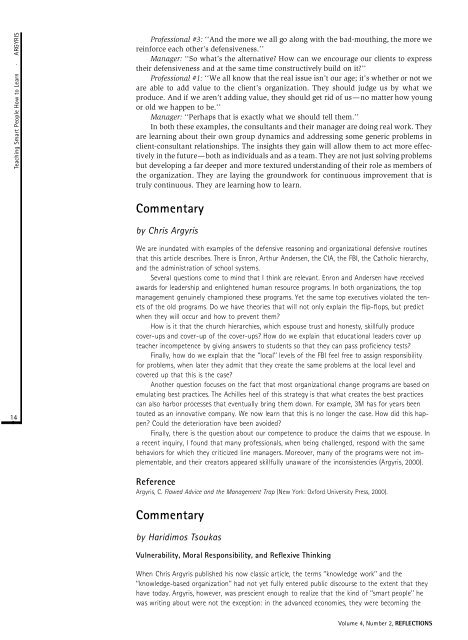

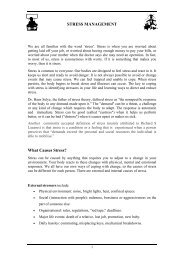

![Finale 2006 - [autumn leaves.MUS]](https://img.yumpu.com/46046993/1/184x260/finale-2006-autumn-leavesmus.jpg?quality=85)
